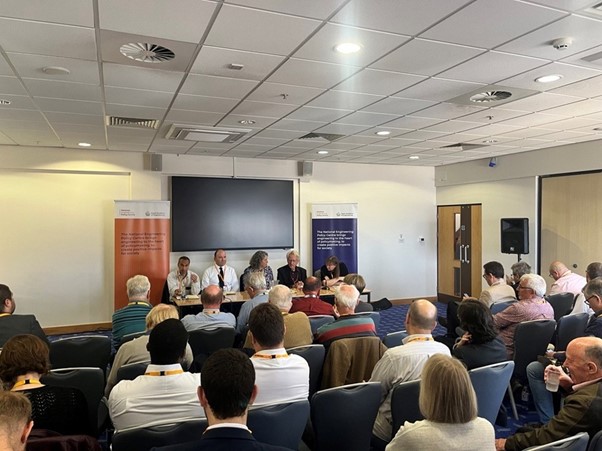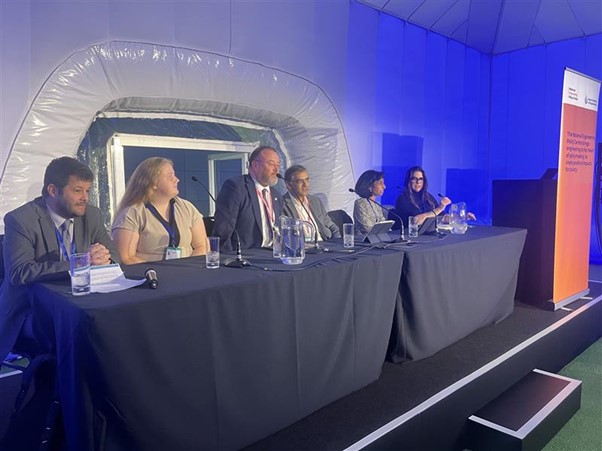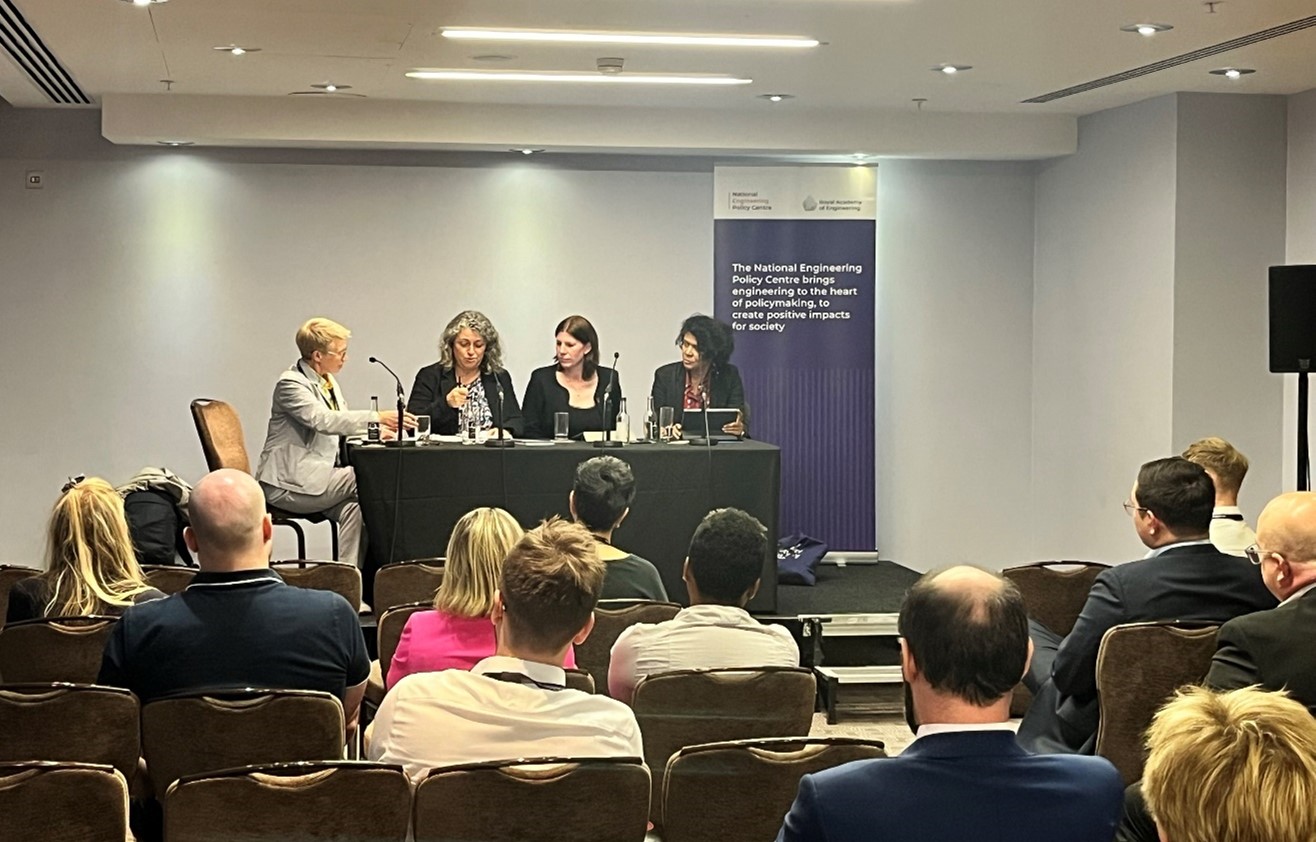The National Engineering Policy Centre brings engineering to the heart of policymaking, and this October we held panel events at the Liberal Democrat, Conservative, and Labour party conferences, in Bournemouth, Manchester, and Liverpool.
Each conference was an opportunity to promote the engineering community’s role in policymaking, while also developing the partnerships and networks that will serve us and the whole engineering profession well in the coming general election.
Our event series, The Road to 2050: How Engineering Can Get the UK to Net Zero, covered a broad swathe of net zero policy questions. From infrastructure to energy systems and solving the STEM skills gap to ensuring the public remains on board with efforts to decarbonise; each of our events boasted experts adept in offering nuanced solutions drawn from a systems view of the challenges the UK faces.
Panel chair Dr Hilary Leevers, CEO of EngineeringUK, writes about the first event on the NEPC conference calendar
The series started in Bournemouth, where our panel at the Liberal Democrat conference was greeted by a full room, eager to hear what the engineering community had to say on addressing the challenge of climate change.
The panel I chaired featured views from: Liberal Democrat Spokesperson on the Construction Industry, Lord Stunell; CEO of Pure Data Centre Group, Dame Dawn Childs DBE FREng; Head of the Department of Chemical Engineering at Imperial College London, Professor Nilay Shah OBE FREng; and Institution of Structural Engineers Technical Director Patrick Hayes.
Each opened with their view on how the profession can contribute to achieving net zero. Lord Stunell spoke passionately about the challenges of reducing carbon emissions from homes during construction and beyond. He called for a re-examination of how and when homes can and should be upgraded to make then carbon neutral.

Dame Dawn highlighted the lack of skills, materials and green energy needed to decarbonise critical infrastructure such as data centres. She stated that policymakers must do more to deliver green infrastructure and provide renewable energy.
Professor Shah spoke about the need for a more joined up, holistic approach to planning – a systems approach – which helps to dictate where and when investment and skills will be needed. He listed a number of ’low regrets’ options – actions that should be taken immediately to help achieve net zero – and explained the need for honesty in communication around the costs and benefits of measures.
Mr Hayes covered a few of the many factors needed to help industries decarbonise: standards and legislation, addressing greenwashing, being realistic about carbon capture, effective reporting, and adaptable targets. He called on the government to support industry through measures such as R&D tax credits.
I then opened the discussion to questions from the floor, starting with one on how the cost of living can be balanced with the investment needed to achieve net zero. Other questions covered issues including how to better use heat pumps, how to support heavy industry to decarbonise, how much impact carbon capture can realistically achieve and how to incentivise the public to make their homes carbon neutral.
Overall, I thought the event was really positive in terms of the level of interest and engagement we had with the topic and the extent to which the panel drew on the breadth of their expertise to take a solutions-oriented approach to their responses. They conveyed how, with the right policies in place, we could be well positioned to respond to the challenge of achieving net zero.
Rashik Parmar, CEO of BCS, on chairing the panel at the Conservative Conference
Moving north to Manchester for the Conservative party conference, I chaired a panel featuring David Duguid MP, member of parliament for Banff and Buchan and vice chair of the APPGs on British Offshore Oil and Gas Industry; Carbon Capture, Utilisation and Storage; Energy Security; and Marine Energy. He was joined by Dr Stephanie Baxter, the Innovation and Skills Lead for the Institute of Engineering and Technology; Dr Edwin Barker, Chartered Civil Engineer and Fellow of the Institution of Civil Engineers; Charlotte Wilkes, an Apprentice Mechanical Engineer at the UK Atomic Energy Authority; and Dr Jen Baxter, an internationally recognised expert in sustainability, environment, energy system development and infrastructure.
Mr Duguid spoke about the current and future need for engineering skills and the challenges of getting young people into STEM. He said that engineers are still needed in polluting industries, but the challenge is to ensure that engineers are able to transfer the use of their skills to green jobs as the transition to net zero continues.

Ms Wilkes said that closing the skills gap would rely on educating young people about the opportunities that exist in engineering careers, so that they aspired to joining the profession.
Dr Barker warned that efforts toward net zero are being affected by cuts in investment in infrastructure. He urged a balance of interventions to speed up progress, such as demand management, which could cut carbon emissions quickly. These interventions could include integrated transport to increase the sharing of journeys, digital connectivity, technological advances of existing systems, such as in rail design, and effective water management.
Jen took the audience through her approach as the Deputy Chair of the National Infrastructure Commission for Wales, where she took a view on questions of infrastructure development. She believes that the immediate focus for achieving net zero should be greening the electricity grid, with the grid then acting as a catalyst for other developments. In particular, we should focus on how power systems can be built better, and how that energy can then be stored and transferred.
Dr Baxter shared with the audience the findings from a recent survey of the IET’s membership. She examined how the results pointed to thttps://nic.org.uk/https://nic.org.uk/he UK’s overall skills challenge and how this impacts on the country’s ability to deliver net zero. The survey found that there exists a general lack of the engineering skills needed to achieve net zero, in particular the skills needed by electrical engineers, retrofitters, ‘problem solvers’, and those who can be upskilled in certain technologies, like heat pumps or digital.
I then opened the discussion to contributions from the floor, starting with a question on whether the UK has the right training to get the skills it needs.
The audience questions touched on the opportunities presented by AI, the technologies that will make the most impact on achieving net zero, how to bring the public along with policymakers given the cost of living crisis, the impact of workforce shortages on smaller businesses, how the UK can be made a more attractive destination for skilled workers and engineering businesses, and the comparative efficiency of electric vs other sources of power.
Hilary Leevers writes on joining the panel at the Labour party conference
Capping off the NEPC’s travels for 2023, our event at Labour Conference was chaired by Fiona Harvey, Environment Editor at the Guardian. The panel featured Shadow Minister for Science, Innovation and Research, Chi Onwurah MP, Rachel Skinner CBE FREng, Executive Director at WSP, and I was there again, having swapped seats from chair to participant this time around.
Ms Skinner began by talking about the role that engineers are already playing in achieving net zero. Encouraged though she was by key speeches at Labour Conference, she stressed the need to move the focus of discussion onto delivery. She highlighted the need for a massive skills change across the profession. She reflected that engineers were among the most highly trusted professions in the UK and so urged them to find their voice for the public good.

I expressed my view that net zero could be delivered, but that the limiting factor is political will rather than the available knowledge. I stressed the need for long term planning, stability, and finance, and highlighted the skills gap, which is restricting the ability of engineers to deliver the needed change. We have the opportunity to remedy workforce issues by diversifying the profession, but we need a clear and comprehensive STEM education and skills plan.
The Shadow Minister referenced her previous work as an engineer, saying she strongly and passionately believes that engineering and politics are intertwined as the ‘twin engines of progress’. She explained some of the challenges faced by engineers, including a lack of diversity in the profession, stating that there was a need for long-term thinking in policy. Ms Onwurah concluded that the contribution of engineers should be better communicated to the public to encourage more people into the profession.
Questions ranged from the role of private investment in financing the race to net zero and the need for stability to foster innovation, to the role of climate change standards. We were also asked about the immediate infrastructure challenges the UK faces, how businesses can better invest in training, how to bridge the skills gap, how to get the public to value the profession as much as it is trusted and what progress on adaptation the next Government needs to make.
Reflections on conference season
There was a strong and welcome presence of sessions and exhibitors relating to engineering and technology, acknowledging their importance in tackling climate change. As with our own NEPC discussions, many sessions highlighted that the need to address STEM skills shortages was well recognised by policy makers and other speakers. We can only hope that these inputs will influence future government announcements and manifesto writers.
Party conferences are busy, chaotic events, with all manner of voices vying for attention. Despite the clamour, it is vital for the engineering profession to engage. As our panellists demonstrated, engineers have the connections, the skills, and the knowledge required to meet some of the most urgent national and global challenges. Engineers are adept at designing robust solutions to complicated and nuanced problems and comfortable at working at the whole-system level.
As the issues we face become ever more complex, the NEPC’s mission to bring engineering to the heart of policymaking will only become more important. So stay tuned for more from the NEPC soon.
